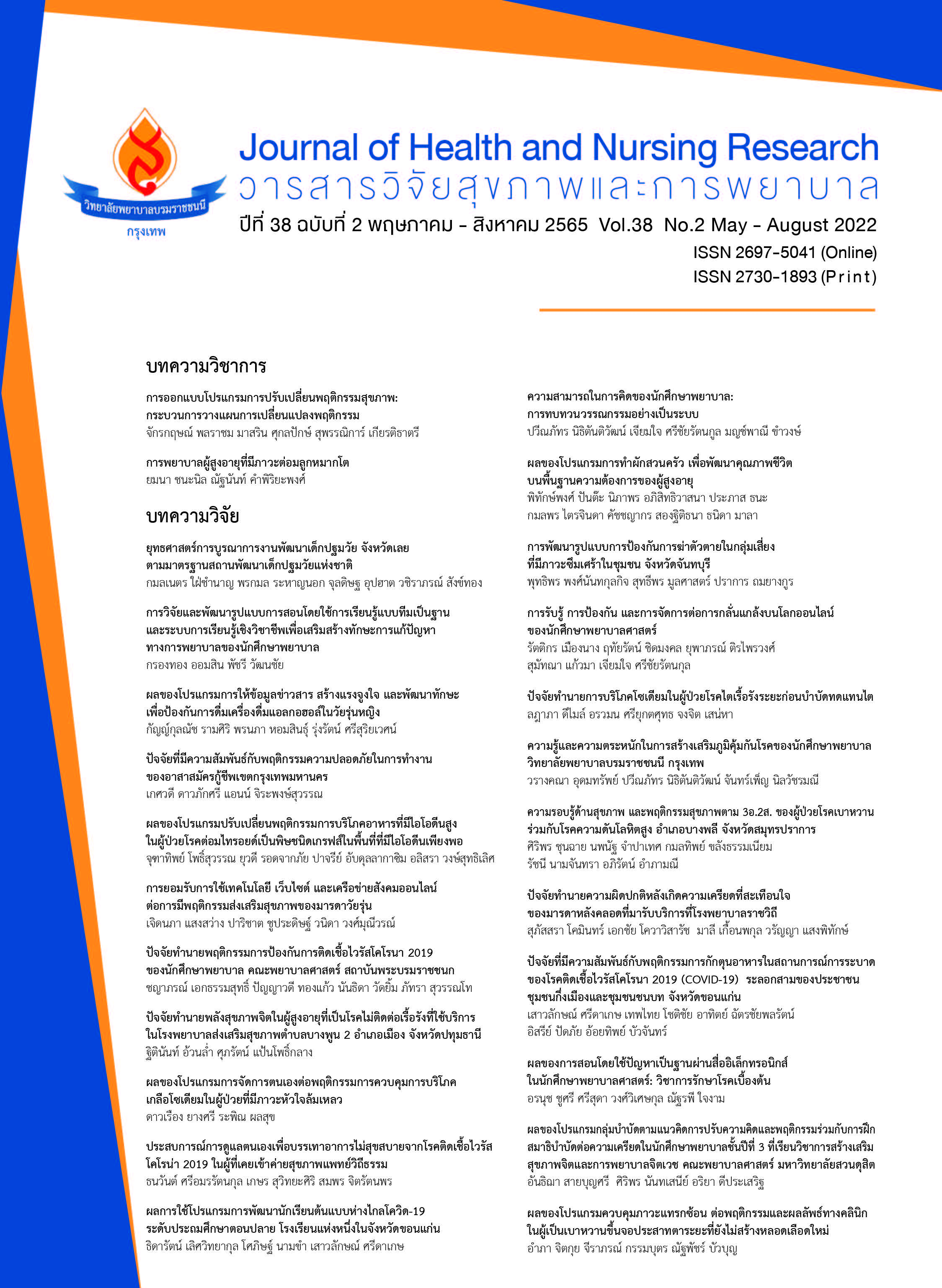ผลของโปรแกรมการจัดการตนเองต่อพฤติกรรมการควบคุมการบริโภคเกลือโซเดียมในผู้ป่วยที่มีภาวะหัวใจล้มเหลว
คำสำคัญ:
การจัดการตนเอง, ภาวะหัวใจล้มเหลว, พฤติกรรมการควบคุมการบริโภคเกลือโซเดียมบทคัดย่อ
บทนำ: ภาวะหัวใจล้มเหลว เป็นการเจ็บป่วยเรื้อรังที่เป็นปัญหาสำคัญของระบบสาธารณสุขและมีอัตราการเสียชีวิตสูงทั่วโลก นอกจากนี้ยังพบว่ามีอัตราการเพิ่มขึ้นของผู้ป่วยภาวะหัวใจล้มเหลวรายใหม่สูงขึ้นทุกปี
วัตถุประสงค์การวิจัย: เพื่อศึกษาผลของโปรแกรมการจัดการตนเองต่อพฤติกรรมการควบคุมการบริโภคเกลือโซเดียมในผู้ป่วยที่มีภาวะหัวใจล้มเหลว โดยประยุกต์ใช้แนวคิดการจัดการตนเองของ Lorig and Holman
ระเบียบวิธีวิจัย: งานวิจัยนี้เป็นการศึกษาวิจัยกึ่งทดลองแบบสองกลุ่มวัดก่อนและหลังการทดลอง กลุ่มตัวอย่าง คือ ผู้ป่วยภาวะหัวใจล้มเหลวทั้งเพศชายและหญิงอายุระหว่าง 30-59 ปี ได้รับการตรวจวินิจฉัยและการรักษาจากแพทย์อย่างน้อย 6 เดือน ซึ่งมีระดับ NYHA Class I-III ที่มารับบริการคลินิกหัวใจล้มเหลว แผนกผู้ป่วยนอก โรงพยาบาลตำรวจ จำนวน 48 คน แบ่งเป็นกลุ่มควบคุมและกลุ่มทดลอง กลุ่มละ 24 คน โดยกลุ่มควบคุมได้รับการพยาบาลตามปกติในขณะที่กลุ่มทดลองได้รับโปรแกรมการจัดการตนเอง ผ่านกระบวนการฝึกทักษะการจัดการตนเองที่จำเป็น 6 ขั้นตอนเป็นระยะเวลา 4 สัปดาห์ เครื่องมือที่ใช้เก็บรวบรวมข้อมูล คือแบบสอบถามข้อมูลส่วนบุคคล และแบบสอบถามพฤติกรรมการบริโภคเกลือโซเดียมของผู้ป่วยที่มีภาวะหัวใจล้มเหลว วิเคราะห์ข้อมูลโดยการใช้ร้อยละ ค่าเฉลี่ย ส่วนเบี่ยงเบนมาตรฐาน Kolmogorov-Smirnov Test, Independent t-test และ Paired t-test
ผลการวิจัย: พบว่าหลังการทดลองพฤติกรรมการควบคุมการบริโภคเกลือโซเดียมในผู้ป่วยที่มีภาวะหัวใจล้มเหลวในกลุ่มทดลองดีกว่ากลุ่มเปรียบเทียบอย่างมีนัยสำคัญทางสถิติ (p<.05) และสูงกว่าก่อนการทดลองอย่างมีนัยสำคัญทางสถิติ (p<.05)
สรปุผล: โปรแกรมการจัดการตนเองที่พัฒนาขึ้นจากแนวคิดของ Lorig and Holman ทำให้เกิดการเปลี่ยนแปลงพฤติกรรมการควบคุมการบริโภคเกลือโซเดียมในผู้ป่วยที่มีภาวะหัวใจล้มเหลวไปในทางที่ดีขึ้น
ข้อเสนอแนะ: หน่วยงานด้านสาธารณสุขสามารถนำโปรแกรมไปประยุกต์ใช้ในการดูแลผู้ป่วยที่มีภาวะหัวใจล้มเหลวเพื่อป้องกันภาวะแทรกซ้อน การกำเริบของโรค และส่งเสริมคุณภาพชีวิตให้ดีขึ้น
Downloads
เอกสารอ้างอิง
American Heart Association. Heart Disease and Stroke Statistics 2019 Update A report from the American Heart Association [internet]. 2019 [cited 2019 July 17]. Available from: http://www.American Heart Association.org.
Centers for Disease Control and Prevention. National center for heart failure statistics in the United State [internet]. 2019 [cited 2019 Aug 10]. Available from: http://www.American Heart Association.org.
Ministry of Public Health. Annual report of non commicable diseases [Internet]. 2016 [cited 2016 Mar 19]. Available from:http://www.thaincd.com. (in Thai).
Philipson H. Salt and fluid restriction is effective in patients with chronic heart failure. European Journal of Heart Failure 2013;15(11):1304-10.
Bentley B. Factors related to nonadherence to low sodium diet recommendations in heart failure patients. European Journal of Heart Failure 2005;4(4):331-6.
Yancy CW, Jessup M, Bozkurt B, Butler J, Casey D, Colvin MM, et al. 2017 ACC/AHA/HFSA Focused Update of the 2013 ACCF/AHA Guideline for the Management of Heart Failure: A Report of the American College of Cardiology/American Heart Association Task Force on Clinical Practice Guidelines and the Heart Failure Society of America. Circulation 2017; 136(6): e137-e161.
Baliga R, Haas G. Management of heart failure Volume 1: Medical. London: Springer; 2015.
Heart failure society of America. How to follow a low-sodium diet [Internet]. 2013 [cited 2019 Mar 19]. Available from: http://www.hfsa.org.
Somsubsin P, Tumnong C. Effect of self-management program on self-management behaviours in patient with congestive heart failure. Journal of Nurses Association of Thailand, North-Eastern Division 2012;30(4):88-94. (in Thai).
Srikong P, Ua-Kit N. Selected Factors Related to Self-management on Dietary Control Among Heart Failure Patients in Lower Northeast Region. Kuakarun Journal of Nursing.2013;18(1):52-66. (in Thai).
Suwanno J, Petsirasan R, Prasearttha P, Chanpradi A, Saisu W. Self-care among patients with chronic heart failure. Thai Journal of Nursing Council 2008;23(1):35-47. (in Thai).
Komcheab J. Relationships among knowledge, perceived barriers, perceived benefit, social support, self efficacy and sodium consumption behaviors in heart failure patiens [master’s thesis]. Bangkok:Chulalongkorn University; 2013. (in Thai).
Chamberlain R, Sond J, Mahendraraj K, Lau C, Siracuse B. Determing 30-day readmission risk for heart failure patients; the Readmission After Heart Failure scale. International journal of general medicine. 2018;11(1):127-41.
Srisuk N. Factors associated with health-related quality of life in patients with chronic heart failure [master’s thesis]. Bangkok: Chulalongkorn University; 2008. (in Thai).
Welsh D, Lennie TA, Marcinek R, Biddle MJ, Abshire D, Bentley B, et al. Low-sodium diet self-management intervention in heart failure. European Journal of Cardiovascular Nursing 2013;12(1):87-95.
Kiatseesakul J, Momkong S, Pankakdee O. The effect of a supportive educational program on knowledge self-care behaviour, and the level of severity of heart failure.Thai Journal of Cardio-Thoracic Nursing 2008;19(2):23-39.(in Thai).
Rerkluenrit J, Wonnapong S. Development of a self-care program for heart failure patient in Nakhonnayok province; a participatory action research project. Thai Journal of Nursing Council 2014;29(4):64-78. (in Thai).
Ritklar L, Wattana C, Kitipawong P. Effects of Self-management Program on self-management behaviours, dyspnea, activities of daily living, and quality of life amomg patients with congestive heart failure. Nursing Journal 2012;39(1):64-76.(in Thai).
Lorig KR, Holman HR. Self-management education history definition outcomes and machanisms. Annals of behavioral medicine: a publication of the Society of Behavioral Medicine 2003;26(1):1-7.
Wattana C. Self-management Suport Strategies for Promotion Disease Control. Journal of Phrapokklao Nursing College 2015;26(1):117-27. (in Thai).
American Heart Association. Definition and Classes of Heart Failure. [internet]. 2019 [cited 2019 July 17]. Available from: http://www.American Heart Association.org.
Kongpibarn S. The effect of self-mamagement program on eating behaviors of persons with heart failure [master’s thesis]. Bangkok:Chulalongkorn University; 2015. (in Thai).
Burns N, Grove SK. The practice of nurse research: appraisal, synthesis, and generation of evidence. 7th ed. St. Loius: Elsevier Saunders; 2013.
Albert NM. Predictor of perceived diet self-efficacy in patient with heart failure. [internet]. 2005.[cited 2019 July 17]. Available from: http://rave.ohiolink.edu/etdc/view?acc_num=kent1120753474
Leventhal H, Meyer D, Nerenz D. The Common Sense Representation of Illness Danger. New York: Pergamon Press; 1980.
Polit D, Hungler B. Nursing Research: Principle and Method. Philadelphia: Lippincott Company; 1999.
Honchai T, Soivong P, Lukkahatai N. Effects of a self-management behavior and symptom distress among breast cancer patients receiving chemotherapy. Nursing Journal 2013;40(1):14-22. (in Thai).
Hambleton RK, Swaminathan H, Algina J, Coulson DB. Criterion-Referenced Testing and Measurement: A Review of Technical Issues and Developments. Review of Educational Research 1978;48(1):1-47.
Polit DE, Beck CT. Essentials of Nursing Research. 9th ed. Philadelphia. : Lippincott Williams & Wilkins; 2017.
Karnjanawanit R. Comprehensive heart failure management program. [master’s thesis]. Chiang Mai: Chiang Mai University; 2015. (in Thai).
ดาวน์โหลด
เผยแพร่แล้ว
รูปแบบการอ้างอิง
ฉบับ
ประเภทบทความ
สัญญาอนุญาต
ลิขสิทธิ์ (c) 2022 วารสารวิจัยสุขภาพและการพยาบาล (วารสารวิทยาลัยพยาบาลบรมราชชนนี กรุงเทพ)

อนุญาตภายใต้เงื่อนไข Creative Commons Attribution-NonCommercial 4.0 International License.
บทความที่ได้รับการตีพิมพ์ เป็นลิขสิทธิ์ของวารสารวิจัยสุขภาพและการพยาบาล (วิทยาลัยพยาบาลบรมราชชนนี กรุงเทพ) ไม่สามารถนำไปตีพิมพ์ซ้ำในวารสารฉบับอื่น


















